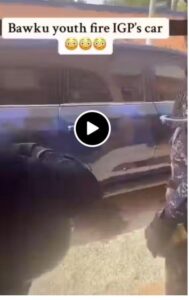IGP’s Convoy Reportedly Attacked in Bawku:
 In what appears to be one of the boldest acts of violence against Ghana’s security establishment in recent times multiple media reports and sources from the Upper East Region indicate that the convoy of the Inspector General of Police (IGP) was reportedly attacked during a working visit to the Bawku Municipality—a known hotspot for ethnic and chieftaincy-related tensions.
In what appears to be one of the boldest acts of violence against Ghana’s security establishment in recent times multiple media reports and sources from the Upper East Region indicate that the convoy of the Inspector General of Police (IGP) was reportedly attacked during a working visit to the Bawku Municipality—a known hotspot for ethnic and chieftaincy-related tensions.
Though official confirmation is yet to be issued by the Ghana Police Service as at the time of this publication, preliminary accounts from local journalists and security observers suggest that the IGP’s convoy may have come under gunfire while on its way to engage local chiefs and community leaders on matters related to peace and stability in the area.
Eyewitnesses claim that heavy gunfire erupted unexpectedly prompting a swift defensive response from the security personnel escorting the IGP. Fortunately no fatalities or serious injuries have been confirmed and the IGP is reportedly safe. The motive behind the alleged attack remains unconfirmed, though many suspect it could be tied to the longstanding conflict in Bawku—an area that has experienced intermittent violence for years.
The Bawku crisis rooted in deep-seated ethnic and traditional disputes has posed a significant challenge to successive governments, with heightened security presence often required to maintain relative calm in the region.
This incident—if confirmed—raises pressing concerns about the state of internal security in Ghana. The notion that even the top police officer in the country could be targeted during an official assignment has sparked debate among political leaders, analysts and the general public.
Security experts argue that this development whether an attempted attack or an isolated clash near the IGP’s convoy, underscores the growing volatility in some regions and highlights the urgent need for enhanced intelligence gathering, community engagement, and conflict resolution mechanisms.
Though the Ghana Police Service and the Ministry of the Interior are yet to release a formal statement several public figures and civil society organizations have called for calm and urged the government to immediately strengthen peace-building efforts in Bawku and other troubled areas.
On social media hashtags like #SecureGhanaNow, #BawkuPeace, and #IGPVisit are gaining traction with users demanding answers and calling on the government to take a more proactive approach to addressing security issues across the country.
Political analysts are warning that Ghana must not treat this incident lightly. They are calling for a national dialogue that involves traditional rulers, youth leaders, security personnel, and local stakeholders to address the root causes of unrest in Bawku and other conflict zones.
Beyond deploying armed forces, many believe the real solution lies in sustained dialogue, socio-economic investment and a renewed commitment to justice and equity.
As Ghanaians await official communication and clarity from the authorities, one thing remains certain—there is an urgent need to review and strengthen internal security mechanisms across the country. Whether this reported incident was a deliberate attack or a result of ongoing hostilities in Bawku, the safety of national leaders and the ordinary citizen must be prioritized.
Ghana has long enjoyed the reputation of being one of West Africa’s most stable democracies. It is now up to the government security agencies, and the people to work together to preserve that legacy.

